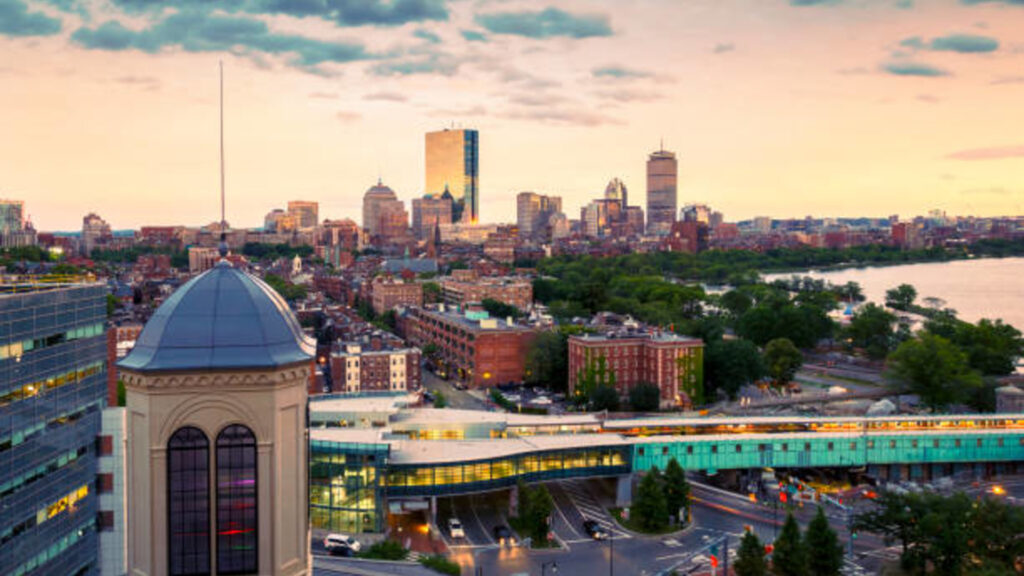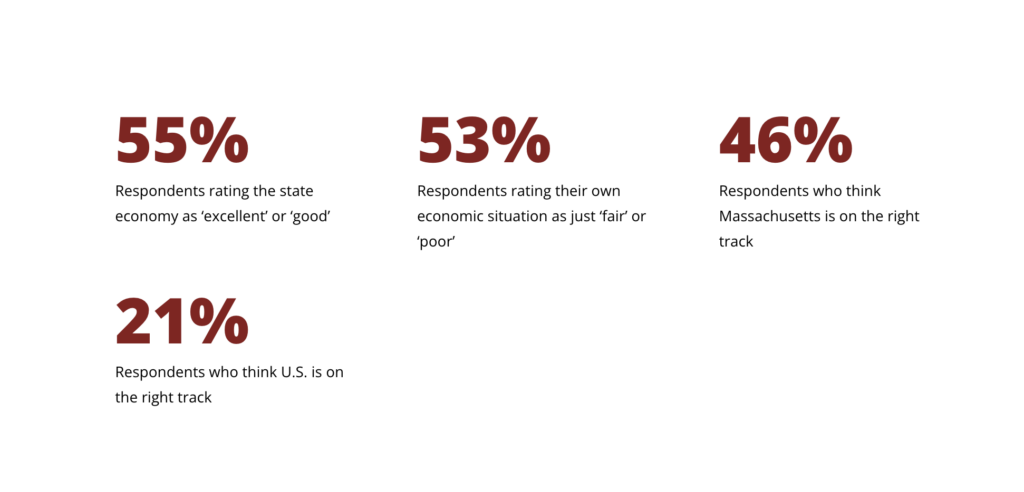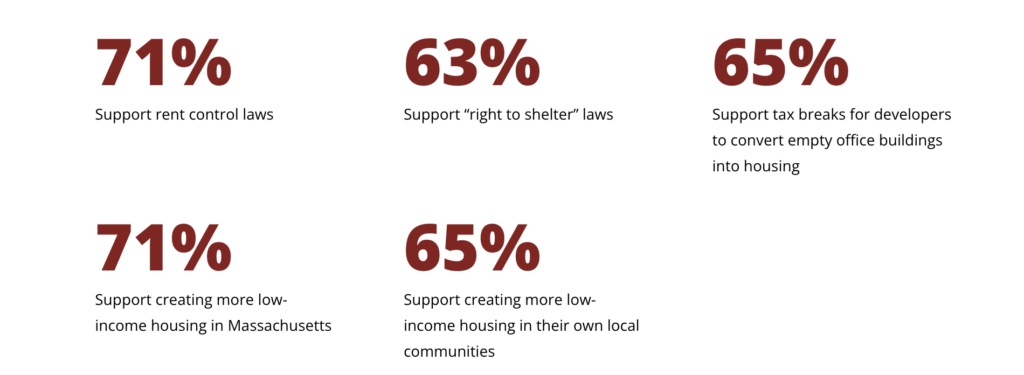Mass Residents Show Broad Support for Policies to Ease Housing Crunch

Aerial view of Boston and historic architecture. Photo: umass.edu
Increasing Low-income Housing, Converting Office Buildings, Rent Control and “Right to Shelter” Laws All Find Support in New Survey of Issues Facing the Commonwealth
Source: UMass News and Media
As Bay State residents overwhelmingly indicate that their chief concern is the current housing crunch in the commonwealth, a new statewide UMass Amherst / WCVB Poll has found that policies aimed at easing the housing shortage all receive broad support across the political spectrum.
The survey of 700 Massachusetts residents conducted Oct. 13-20 found that while the outlook for the state economy is strengthening and growing numbers say the commonwealth is on the right track, the housing issue casts a shadow over the prospects for prosperity as the main issue facing the state right now.
“Let the good economic times roll,” says Tatishe Nteta, professor of political science at UMass Amherst and director of the UMass Poll. “Just three years since the economic downturn resulting from the COVID-19 pandemic, the state has bounced back with a vengeance. Today, with the Bay State experiencing rising wages, historically low levels of unemployment and home prices hitting record highs, residents of the commonwealth are bullish on the state of the Massachusetts economy with 55% rating the state economy as ‘excellent’ or ‘good’ – an eight percentage point increase from this time last year.”
“Although Massachusetts residents have a positive view of the state’s economic situation overall, these perceptions are not universally shared,” cautions Jesse Rhodes, professor of political science at UMass Amherst and co-director of the UMass Poll. “Those with less education and lower incomes have noticeably less rosy views of the direction of the state than do those with more education and higher incomes. It’s also notable that while a majority of the state’s residents view the state’s economy favorably, a majority (53%) also views their own economic situation as ‘fair’ or ‘poor.’ This suggests that a large fraction of Massachusetts residents feels left out of the state’s good economic times.”

“Massachusetts residents perceive the state is doing better than the rest of the nation – 46% think the commonwealth is on the right track, while just 21% feel this way about the nation,” notes Raymond La Raja, professor of political science at UMass Amherst and co-director of the UMass Poll. “Those who don’t think the state is on the right track tend to be middle- and lower-income residents. For example, 42% of residents with family incomes of $40,000 to $100,000 say Massachusetts is on the wrong track, compared to just 28% of residents with incomes over $100,000, and the sentiment appears to be growing. Among middle-income residents more people feel this way today than just six months ago, when 33% said Massachusetts was on the wrong track. Surely, this must have something to do with the intensifying high cost of living in the state.”
Housing Concerns… and Potential Remedies
Indeed, while the economy has shown marked improvement post-COVID, Nteta warns that the poll found 38% of respondents indicate they have considered leaving the Bay State in the past year, an increase of three percentage points from when the question was asked last fall, and he says that the cost of housing is a major reason why.
“The economic upswing that the state has experienced in recent years, coupled with the state’s reputation as a hub for the biomedical and healthcare industries, its world-renowned institutions of higher education, and the state’s penchant for progressive politics, policies and elected officials have resulted in Massachusetts becoming a destination of choice for many people both in and outside of the United States,” he says. “However, the same factors that have attracted many to our state have also led some to contemplate leaving the Bay State, with close to 4-in-10 indicating that they have thought about moving from Massachusetts to another state. Concerns about the rising cost of living in the Bay State, frustration with the state’s progressive politics, and the belief that new and better opportunities exist outside the state’s boundaries are frequently cited by those who are contemplating such a move, with the state of Florida emerging as the most popular destination for those looking to leave the commonwealth.”
“Young people, who are essential for the state’s future prosperity but are particularly sensitive to housing costs, are among the most likely to indicate that they’ve considered leaving at 48%,” Rhodes says. “This should be a major red flag for state leaders concerned about the future of the commonwealth.”
La Raja points to the poll’s results showing that the respondents overwhelmingly support each of a slate of potential policies to remedy the housing issue.
“Massachusetts voters seem highly supportive of a range of housing policies that would increase housing, including low-income housing in their own communities,” he says. “More than 7-in-10 support building more low-income housing in Massachusetts, and nearly two-thirds – 65% – of residents said they would support building more low-income housing in their own local community. Young people are especially more likely to want more low-income housing in their local communities, with 75% supporting this policy, compared to 52% of residents over age 55. That’s a 23-point gap. Keep in mind that young people in our survey are also the ones who are most likely to contemplate leaving the state – 48% of 18-29-year-olds said this, compared to 36% of 30-54-year-olds. Dealing with housing costs seems like an issue that state leaders need to grapple with, especially if they want to maintain a healthy labor market of young residents.”
Support for Various Housing Initiatives in Massachusetts

Likewise, 71% of the poll’s respondents support rent control policies allowing local governments to set limits on how much rents can be increased each year and 65% support providing tax breaks to developers to convert empty office buildings into housing.
Another policy garnering high support in the new survey is the “right to shelter” law, which requires the commonwealth to provide shelter, food and basic necessities to homeless parents with children, pregnant women and migrant families.
“As the state experiences an influx of migrants, refugees and asylum seekers as well as a rise in the number of homeless families and pregnant women, the state’s commitment to provide housing, food and basic necessities to these communities through the ‘right to shelter’ law has been put to the test,” Nteta says. “While some local elected officials have called on Gov. Healey and the Massachusetts state Legislature to amend – if not end – the state’s ‘right to shelter’ law, the law remains popular with 63% of residents expressing support, including majoritarian support for the law expressed by groups across the gender, age, income, racial and educational divides. While fulfilling the state’s 40-year obligation to these families has become expensive in recent years, residents of the Bay State remain steadfast in their desire to provide shelter to its most vulnerable residents.”
La Raja notes that the poll’s respondents do not pin the blame for the shelter crisis on migrants, though.
“Massachusetts voters primarily hold the president, Congress and state Legislature responsible for the challenges of housing people in emergency shelters,” he says. “They are reluctant to blame it on the migrants themselves for ballooning costs – only 13% say migrants are to blame for the state paying an estimated $45 million to house them and other homeless people.”
Nteta agrees, saying, “As the state grapples with the logistical and financial challenges in providing shelter, food and basic necessities to over 20,000 homeless and migrant families, many prominent lawmakers on Beacon Hill and in local communities have called on the federal government to assist in alleviating this problem. While these calls for assistance have for the most part fallen on deaf ears, citizens of the state believe that this crisis falls on the feet of the federal government with close to 6-in-10 pointing to President Joe Biden (29%), Congressional Republicans (24%), or Senate Democrats (6%) as the most responsible for the crisis.”
In addition to the housing issue, Nteta notes that the commonwealth’s political minorities also emerge as prime emigration candidates in the survey’s results.
“For the first time in almost a decade, there are currently no Republicans occupying statewide elected offices in the Bay State,” he says. “With the state Republican Party beset by infighting that, in part, resulted in the state’s most popular governor in a generation to leave the office, the prospect of a Republican winning statewide office is slim. Given this political reality, it is by no means a surprise that the groups most seriously contemplating leaving the state – 59% each – are Republicans, conservatives and Trump voters.”
Ultimately, Nteta says, state lawmakers face an inflection point in addressing the main issue currently on voters’ minds.
“With the state facing skyrocketing home prices, the stock of affordable housing becoming less and less available, rents continuing their upward trajectory and hundreds of thousands of denizens of the state leaving Massachusetts due to the rising cost of living, it is no shock that residents of the Bay State identify ‘housing’ and ‘cost’ as among the most pressing problems facing the state,” he says. “Given the extent of this problem, strong majorities of citizens are open to a wide range of policies from rent control to tax breaks to convert office space into housing to building more low-income housing in the state. With the Democratic Party controlling both the state Legislature and the governor’s office, there are few excuses for the state’s elected officials to not answer this clear clarion call on the issue of housing.”
MBTA Continues on Wrong Track
Once again, the UMass Amherst / WCVB Poll asked residents in Eastern Massachusetts and Worcester County about their thoughts on the MBTA, and once again the results are glum for the Bay State’s primary mass transit system.
“In what is likely unsurprising news, the MBTA receives low marks from residents who depend on the T for their daily commute to the city of Boston,” Nteta says. “A plurality (39%) rate the quality of the T as poor or very poor, and a multitude of negative words such as “unreliable,” “broken,” “slow” and “mess” were most frequently used to describe the MBTA. Newly minted MBTA General Manager Phillip Eng may have the state’s most challenging job, as the T remains beset by slowdowns, closures and safety problems that make commuting in and around Boston a daily nightmare for many citizens.”
Nteta notes, however, that the stain of the MBTA’s failures have yet to reach the governor’s office. As with the migrant crisis, the poll’s respondents place blame for this issue elsewhere.
“The buck apparently does not stop with Governor Maura Healey,” Nteta says. “On two of the core challenges facing the commonwealth, the migrant and the MBTA crises, Healey skates off relatively scot-free from responsibility. Only 5% identify Healey as responsible for the migrant crisis, while a paltry 7% see Healey as responsible for the MBTA’s safety problems, slowdowns and closures. Apparently, Healey’s passing of the blame for these crises to the federal government and former Governor Charlie Baker’s administration has been an effective strategy, but one that may not be sustainable in the long term as Healey moves out of her honeymoon phase with the state’s voters.”
Topline results and crosstabs for the poll can be found at www.umass.edu/poll

I am skeptical that these poll results will show up in increases in local support for actual new affordable housing development.
Zoning opposition and lack of available funding will continue to be major obstacles.
A national issue… needing alignment between local, regional, state, federal: personnel, funders, policy, voters. Another “all hands on deck” issue like addictions (all of them), ageism (very young/mush older), disenfranchisement (all races, classes), etc… Good to see some focus even if in nascent stage here at home (several city councilors, affiliated bd members).